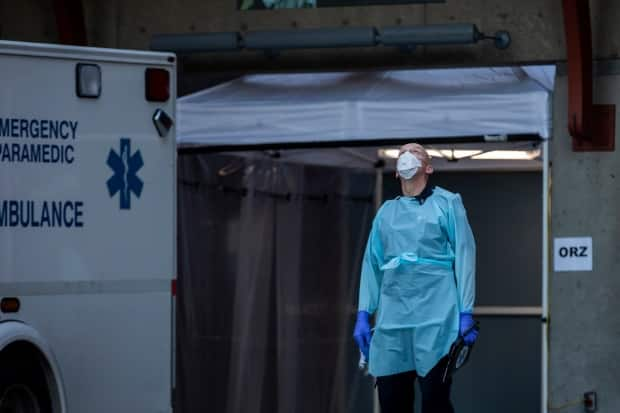Some people use fear, avoidance to discriminate against health-care workers, study suggests
The same people who are honking horns for health-care workers are not any less likely to discriminate against them, according to new research.
In a key finding of the peer-reviewed study out of the University of British Columbia, nearly one-third of North Americans effectively admit to discriminating against health-care workers.
The article, titled "Fear and avoidance of health-care workers: An important, under-recognized form of stigmatization during the COVID-19 pandemic" was published Wednesday in the Journal of Anxiety Disorders.
"What struck me the most was this combination of people getting out there and applauding from the safety of their balconies, but also having some very strong and mistaken beliefs about the dangers that health-care workers pose," Steven Taylor, lead author and a psychiatry professor in the university's faculty of medicine, said in the release.
"Being around health-care workers is not dangerous," it reads.
The research concludes that fear and avoidance of health-care workers is a widespread, under-recognized problem, despite the prevalence of drive-by parades and balcony cheers to pay respect to doctors, nurses, health-care aides, orderlies, home-care workers and others throughout the health crisis.

For example, one-third of people who responded to the survey suggested they would not be comfortable visiting with a health-care worker out of fear of contracting COVID-19.
Repeating history of stigma
The article states it is the first systemic review of the stigma facing health-care workers during the COVID-19 pandemic.
Front-line workers in health care have been ostracized and shunned in previous disease outbreaks, it states, according to historical research.
Taylor's team put its online survey to a random sample of 3,551 people, including 1,835 from Canada and 1,716 from the United States, between May 6 and 19, to see if they would discriminate against health-care workers based on fears they could be carrying the novel coronavirus.
The sample, which excluded health-care workers, does not appear to be representative of the Canadian population based on age, gender, education and employment status, so results cannot be generalized.
A comparable margin of error for a probability-based sample of this size would be +/-2 percentage points for the Canadian portion of this study.
Taylor was not available for an interview.
One in three respondents who participated in this study believed hospital workers are likely to be infected with COVID-19, including 26 per cent who agreed and six per cent who strongly agreed.
"People need to look at the facts and understand that we don't need to add to the stress that health-care workers are already experiencing. If we create burdens on our health-care workers, it's going to undermine their ability to perform their jobs properly," Taylor said.
Nearly half of those polled agreed (14 per cent) or strongly agreed (33 per cent) with the statement, "I do not want to be around health-care workers who treat COVID-19 patients."
In the latest surveillance data reported Thursday by the B.C. Centre for Disease Control, there have been 59 outbreaks, including nine that are currently active, at care facilities across the province. The 699 cases in total at those facilities involved 420 residents and patients, and 279 "staff/other," but the data does not clearly break down the number of affected workers.
Health-care workers are subject to more frequent testing than the general public, and the UBC findings suggest workplace stress is a bigger problem than the risk of getting infected.
Opinions on restricting, isolating workers
More than one-quarter of respondents agreed (21 per cent) or strongly agreed (5 per cent) health-care workers should have restricted freedoms.
More than one in three respondents agreed (26 per cent) or strongly agreed (10 per cent) workers treating patients with COVID-19 should be isolated.
One-third of those polled agreed those same workers should be separated from their families.
The research, funded by the Canadian Institutes of Health Research and the University of Regina, suggests those who stigmatized health-care workers were more likely to avoid other people, avoid drug stores and supermarkets, and avoid leaving their homes.
Stigma and discrimination prevent people from getting tested or accessing the care, treatment and support they need, according to the federal government.
Taylor said in the release the fear of health-care workers is linked to the bigger issue of pandemic-related racism.
The researchers are calling for clear education campaigns to help people understand the actual risk health-care workers pose to the public.

